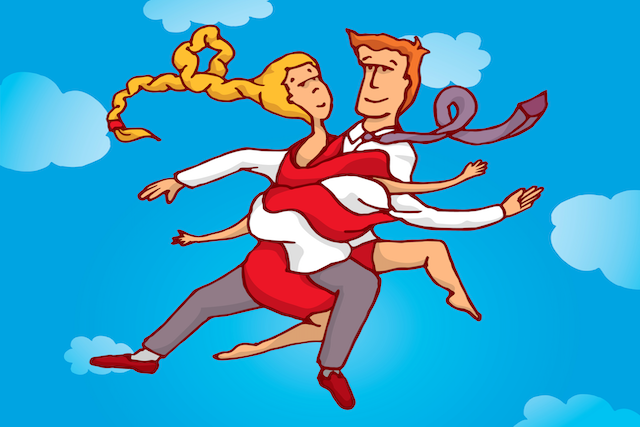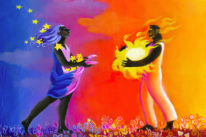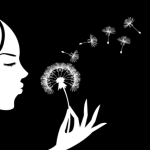
“Be yourself; everyone else is already taken.” ~Oscar Wilde
I remember clearly and will never forget the golden moment when I revealed my truth. Out through the locked up, suppressed little voice hidden deep down within, I allowed myself to say, “I always feel as if I need to give people what they want.”
It was almost as if lighting struck and the clouds parted at the same time. I sat there comfortably in the chair of my therapist’s office, and with a deep breath I knew that “it” was over. I did not know what “it” was, or the amount of work and change that would follow, but I knew that I was ready and willing.
I grew up codependent. From the influence of an alcoholic, narcissistic father to the string of narcissistic relationships formed afterward, my identity evolved through who I was to others and what I had given to them.
A relationship with a narcissist defines your existence as not your own, but as a part of theirs. Others saw me as shy and nice, but I didn’t realize that I was lost and without balance.
I wanted others to be their authentic selves, truthful and free, but I could not do that for myself, so I continued giving up and giving in. Not all was bad—life is beautiful in each form—but I knew I would need to learn something different, as I always struggled with fear and anxiety.
So I have learned something different. It’s taken a long time, but things have been getting better. If you’ve also realized that you are codependent, these ideas may help you dig down and reveal your true, authentic, beautiful self.
Create a relationship with yourself.
Remember the scene in Runaway Bride where Julia Robert’s character decides she will choose what kind of eggs she likes instead of choosing the kinds that her former partners liked? This simple act is where it can all begin. I make an effort to just ask myself honestly, “How are you doing?”
Take time to focus on your preferences, likes, dislikes, and so on, learning more about the things that make you happy and unhappy, and healthy ways to deal and cope with the latter. It’s important to always stay centered.
Establish boundaries.
Being intuitive, I have the ability to feel what others really want. And it’s been hard to say no. One of the most important things in learning to stop people pleasing is to establish personal boundaries. Basic ideas of personal boundaries include when to say no and where to draw the red line.
An example of this would be refusing to let someone convince you to do something you don’t want to do, even if that person tries to manipulate you with negative comments. We can’t change what other people do, but we can change our responses. Enforcing boundaries like this will improve our relationships.
Listen to and trust your own feelings and intuition.
Growing up I learned to frequently feel guilt and shame. I learned to say sorry and explain myself even when I felt that I did not have to. Coming out of that restricted world, I began to take ownership of my own feelings.
Observe what you are feeling and thinking, and remind yourself that you are allowed to have opinions and judgments.
Honor your own needs and intentions.
Growing up I made decisions based on what other people wanted, not for the betterment of myself. I would feel a sense of fear before I would utter a word.
In order to bring awareness to what I was feeling, I began questioning the intention behind my words and actions. This allowed me to understand my own ideas and motives instead of letting other people define them for me. It helps develop a sense of confidence and self-respect, making it easier to communicate our needs to other people.
Create a positive space.
Feeling responsible for others’ actions, thoughts, and reactions would leave me drained and confused. When I began realizing the difference between owning others’ problems and giving them support, I started creating my own positive space. This has a lot to do with boundaries, where someone else ends and where you begin.
I realized I don’t need to take responsibility for other people. If someone hasn’t called me back after three tries of calling them, it’s not my fault or responsibility to get them to call me. If there is a pause in conversation, it’s not my job to fill it.
It is possible to accept the way others are and arrange the pieces that are given, not try to make up for them.
Commit to lifting your self-esteem and confidence.
Bill Murray once said, “The more you know who you are and what you want, the less you let things upset you.” No truer words have been spoken.
I spent a year falling over my own feet and making mistakes. I spent the next year learning and discovering from them. I spent the third dedicated to a practice of loving myself, and now I will spend this year in a state of acceptance, to be aware and solidify that loving-kindness inside.
And you know what? It feels good. Thank you, Bill Murray.
In the end, we are responsible for ourselves and our own happiness. What we create in ourselves we can later skillfully give to others. In this dynamic and vibrant world, loving ourselves not only makes us stronger, but also the people around us.
About Anna Puchalski
Anna enjoys spending her time in nature from engaging in outdoor sports to various forms of recreation and works in the landscaping field. She desires to live from a place of her true self, striving for happiness and harmony with everyone and everything every day.













 Though I run this site, it is not mine. It's ours. It's not about me. It's about us. Your stories and your wisdom are just as meaningful as mine.
Though I run this site, it is not mine. It's ours. It's not about me. It's about us. Your stories and your wisdom are just as meaningful as mine.